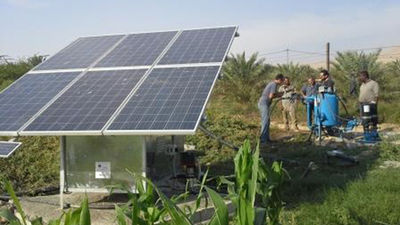Difference between revisions of "PV-Integrated Drip Irrigation and Fertigation Systems"
***** (***** | *****) |
***** (***** | *****) m |
||
| (2 intermediate revisions by 2 users not shown) | |||
| Line 1: | Line 1: | ||
| − | |||
= Overview<br/> = | = Overview<br/> = | ||
| Line 53: | Line 52: | ||
= Progress Update<br/> = | = Progress Update<br/> = | ||
| + | The project has installed 6 PV-Integrated Irrigation Systems in Lebanon, and 4 in Jordan, for a total capacity of 87kW. As a result of the Powering Agriculture project’s visibility, ICU’s partner in Lebanon has installed an additional 600 kW of solar-powered irrigation systems. Some benefits from use of the systems include farming of previously unused land and extended growing seasons, both of which result in increased income. Fertigation also minimizes over-fertilization, which reduces costs. During the second half of 2017, ICU organized 8 commercial events between Jordan and Lebanon to introduce the system to new potential customers.<ref name="Powering Agriculture: http://poweringag.org/innovators/pv-integrated-drip-irrigation-fertigation-systems">Powering Agriculture: http://poweringag.org/innovators/pv-integrated-drip-irrigation-fertigation-systems</ref><br/> | ||
| − | + | <br/> | |
| − | |||
= Further Information<br/> = | = Further Information<br/> = | ||
| − | *[[Portal: | + | *[[Portal:Water and Energy for Food|Water and Energy for Food (WE4F) portal on energypedia]] |
*[http://poweringag.org/innovators Powering Agriculture Homepage, Winners/ Innovators]<br/> | *[http://poweringag.org/innovators Powering Agriculture Homepage, Winners/ Innovators]<br/> | ||
*[[Powering Agriculture: An Energy Grand Challenge for Development|Powering Agriculture: An Energy Grand Challenge for Development]]<br/> | *[[Powering Agriculture: An Energy Grand Challenge for Development|Powering Agriculture: An Energy Grand Challenge for Development]]<br/> | ||
| Line 68: | Line 67: | ||
*Website [http://www.icu.it/en/ Institute for University Cooperation (ICU)]<br/> | *Website [http://www.icu.it/en/ Institute for University Cooperation (ICU)]<br/> | ||
*Website [http://www.nursolarsys.com/ Nur Solar Systems] | *Website [http://www.nursolarsys.com/ Nur Solar Systems] | ||
| + | *[[Toolbox on SPIS|Toolbox on Solar Powered Irrigation Systems on energypedia]] | ||
| + | <br/> | ||
| − | |||
= References<br/> = | = References<br/> = | ||
| Line 75: | Line 75: | ||
<references /> | <references /> | ||
| + | [[Category:Irrigation]] | ||
| + | [[Category:Powering_Agriculture]] | ||
[[Category:Photovoltaic_(PV)]] | [[Category:Photovoltaic_(PV)]] | ||
| − | |||
| − | |||
Latest revision as of 19:24, 14 July 2020
Overview
|
Innovator |
||
|
Project |
||
|
Collaborators |
Nur Solar Systems (Jordan) | |
|
Location Applied |
Water is scarce in the Middle East and North Africa (MENA) region and Jordan is one of the world's driest countries. In Jordan and Lebanon, the widespread use of inefficient irrigation methods results in the waste of large amounts of water. This wasted water could be used for wider and better irrigation of crops. The diffused use of fertilizers and agro-chemicals increases soil salinity and contaminates soil and groundwater. Farmers are also in remote areas with no, or unreliable, access to the electrical grid. Financing can be difficult to obtain and farmers may be reluctant to use innovative methods.[1]
Clean Energy Solution
ICU will install a drip irrigation system powered by PV solar energy at pilot farms. The system supports fertigation, which provides the possibility of fertilizer distribution through the irrigation system. Farmers will be supported in accessing to financing for the installation of the system. The CES will provide a complete package for purchase and installation, including training and access to knowledgeable extension agents and companies’ staff.[1]
Impact
The project will provide energy savings, as farmers will rely on photovoltaic systems for their irrigation energy needs, taking advantage of the 300+ sunny days in their areas. The limited water resources will be saved and used in a more efficient manner. More precise application of fertilizers will make their use more effective, and reduce the amount introduced into the environment. Farmers will benefit from increased and higher quality crop production and the associated increase in revenue.[1]
Organization
The Institute for University Cooperation (ICU) was established in 1966, and is recognized as an NGO for development cooperation by the European Commission and the Italian Ministry of Foreign Affairs. ICU has extensive experience in agriculture, water management, and the environmental sector. ICU has partnered with Nur Solar Systems in Jordan, and Mena Solar in Lebanon. Nur Solar Systems is a leading Jordanian solar systems manufacturing company; Mena Solar specializes in solar energy systems, with a particular expertise in photovoltaics.[1]
Progress Update
The project has installed 6 PV-Integrated Irrigation Systems in Lebanon, and 4 in Jordan, for a total capacity of 87kW. As a result of the Powering Agriculture project’s visibility, ICU’s partner in Lebanon has installed an additional 600 kW of solar-powered irrigation systems. Some benefits from use of the systems include farming of previously unused land and extended growing seasons, both of which result in increased income. Fertigation also minimizes over-fertilization, which reduces costs. During the second half of 2017, ICU organized 8 commercial events between Jordan and Lebanon to introduce the system to new potential customers.[1]
Further Information
- Water and Energy for Food (WE4F) portal on energypedia
- Powering Agriculture Homepage, Winners/ Innovators
- Powering Agriculture: An Energy Grand Challenge for Development
- Powering Agriculture Newsletters
- Jordan Energy Situation
- Lebanon Energy Situation
- Website Institute for University Cooperation (ICU)
- Website Nur Solar Systems
- Toolbox on Solar Powered Irrigation Systems on energypedia





















